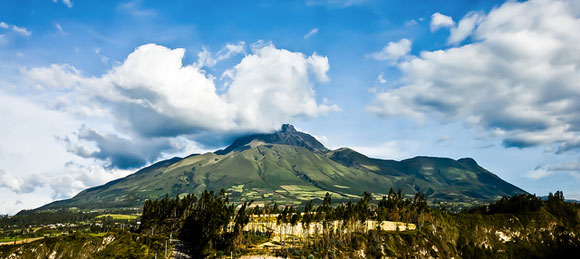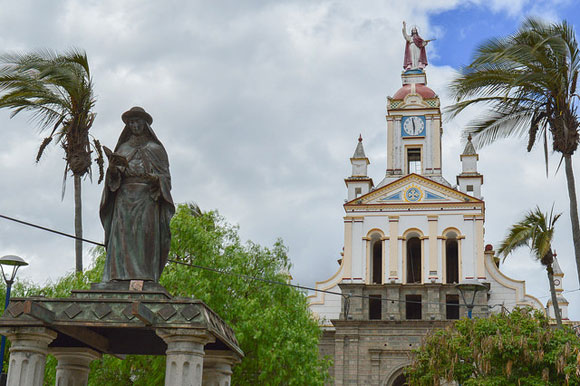Cotacachi, Ecuador
Cotacachi, in the Imbabura province, is getting the lion’s share of expat attention these days. Many, especially those of retirement age, are finding their way here to enjoy the perfect weather, beautiful scenery, low cost of living, and especially the tranquil, slow-paced small-town lifestyle.
Like Otavalo and many other villages in this part of Ecuador, Cotacachi (population: about 8,000) is an artisan town. Just 20 minutes northwest of Otavalo, Cotacachi is Ecuador’s famous “leather” town. Artisan shops line the main street and you can buy any type of leather item, from shoes, boots and jackets to coin purses, bags, and suitcases…even upholstered furniture. Prices for all these items are 50% to 75% less than you would pay in the U.S.
Cotacachi has always enjoyed a reputation as a clean, peaceful village, and its plazas are kept neat and tidy. At night the artisan shops close up and only a few restaurants and small mom-and-pop shops are open. On the corners, you may find families congregating around a hot grill, where ears of corn are roasting along with pork and chicken kabobs. The cool, crisp air smells faintly of wood smoke, roasting corn, and eucalyptus. Eucalyptus trees grow abundantly wild, as do palm trees.
Cotacachi has become one of Ecuador’s most active expat communities in recent years, as many foreigners have chosen to locate here—and they enjoy a great lifestyle in Cotacachi. It’s a small, mostly indigenous town with a strong sense of community.
Largely dependent on agriculture, it is the sort of town many of us remember from our childhoods. Fresh raw milk can be bought from local farms, along with eggs laid by free-range chickens. Children still help with the family businesses after school and are well-mannered.
In the quaint downtown, you’ll find a couple of barbers, a small health clinic, and a pavilion for the town band. Ethnic restaurants and cozy cafés make welcoming spots to catch up with friends or just sit and watch life unfold in the Ecuadorian highlands.
Though Cotacachi has a slow and relaxed pace there are constant events and activities to take part in. Every month at least one parade or festival takes place. There are live music events, dances, and even horse processions to be watched and photographed. Seed exchanges, food fairs, and leather expos are all annual events too.
Of course it’s always nice to explore other areas too and there are plenty of great day-trips to choose from. Within two hours you could be at Chachimbiro Hot Springs relaxing in the thermal springs, or enjoying a mud bath at the spa. Lake Cuicocha is just a 15-minute taxi ride from town where you can marvel at the deep blue volcanic crater lake. If you’re up for some physical activity you can take a four-hour hike around the rim, or if you prefer to relax, take the boat tour around the islands in the center of the lake.
The famed market town of Otavalo is nearby, where you can explore the streets filled with craft items, food, and even animals for sale. Ibarra is a larger city just 45 minutes away with shopping malls, dining options, and large parks and plazas to enjoy.
When the sun sets in Cotacachi, the artisan shops close up and only a few restaurants and small mom-and-pop shops are open. That’s all you need, really. After a day of sunshine in the 8,000-foot-elevation, mountain climate, night-time is for sleeping.
Retire in Cotacachi, Ecuador
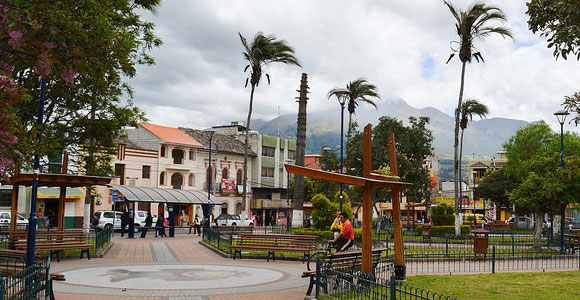
Cotacachi is becoming something of an expat magnet. Estimates are that about 100 expats live full-time in Cotacachi now. It’s a diverse group—not all American. There are Israelis, Cubans, Brits, and more among them, who get together regularly to discuss topics of interest or just to celebrate life. This makes retirement in Cotacachi enjoyable. The expats here are outgoing and relaxed, since there’s not much to worry about. No traffic, no temperature swings, no pesky insects, and certainly no money problems.
The town is also scenic. Two of the most majestic cordilleras of the Andes flank either side of the small village of Cotacachi. And several of Ecuador’s most famous volcanoes can be seen from just about anywhere in town, including Volcan Cotacachi to the west and Imbabura to the east. On a clear day, you can see Volcan Pichincha to the south.
If you want to enjoy good weather, clean air, great scenery, and a rich indigenous culture, but still be within two hours of the international airport in Quito, then retirement in Cotacachi could fit the bill.

Get Your Free Ecuador Report Here:
Learn more about Ecuador and other countries in our daily postcard e-letter. Simply enter your email address below and we'll send you a FREE REPORT - Ecuador: Live Well on Your Social Security.
This special guide covers real estate, retirement and more in Ecuador and is yours free when you sign up for our postcards below.
Lifestyle in Cotacachi, Ecuador
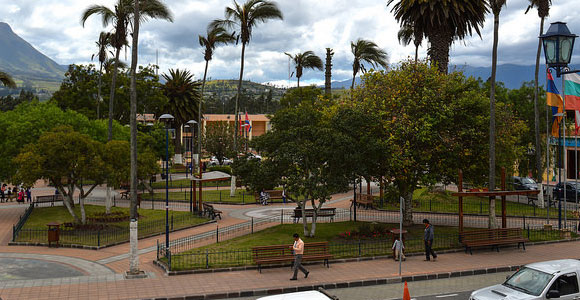
Cotacachi is a fabulous place to improve your health. The moderate climate with little variation throughout the year means that nearly every fruit and vegetable can be grown within a hundred miles. Not only is healthy produce readily available, but it’s also very affordable. With avocados priced at 3 for a dollar, organic leaf lettuce at 25 cents, and 6 plump carrots for 50 cents there is no monetary reason not to eat right.
In addition, the small size of the town makes it perfect for walking. Instead of jumping in your car to run to the grocery store, pay bills, or meet a friend for lunch you can easily accomplish it all with your own two feet. Many folks find that they lose weight without even trying after being in Cotacachi for only a few months. The healthy food choices and extra walking each day help shed excess pounds.
For a small town there are few things lacking. Residents can take advantage of spas, fitness centers, and basic medical needs all within a few blocks of each other. They can also participate in art classes, hiking groups, dance lessons, live musical events, yoga, foreign films, and science courses.
If you’re a social person, Cotacachi is the place for you. There are plenty of other expats to get to know, but the locals are friendly and welcoming too. It’s tough to spend much time in this town without quickly and easily making friends.
Real Estate in Cotacachi, Ecuador
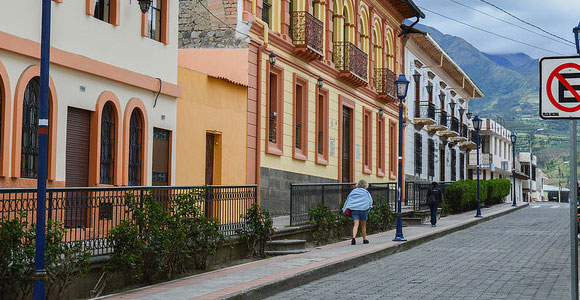
This influx of foreigners has caused something of a building boom in Cotacachi in recent years, and if you come to look for real estate, you’ll be spoiled for choice. Older homes and apartments in need of renovation can be had for the price of a good used car.
Recognizing the trend of foreign baby boomers looking for an unspoiled and inexpensive retirement destination, local builders offer appealing homes and condos with features like large modern kitchens, elegant bathrooms, fireplaces, and more.
Rentals go for as little as $150 a month for a modern, three-bedroom apartment while furnished units with all utilities included go for $600.
Cost of Living in Cotacachi, Ecuador
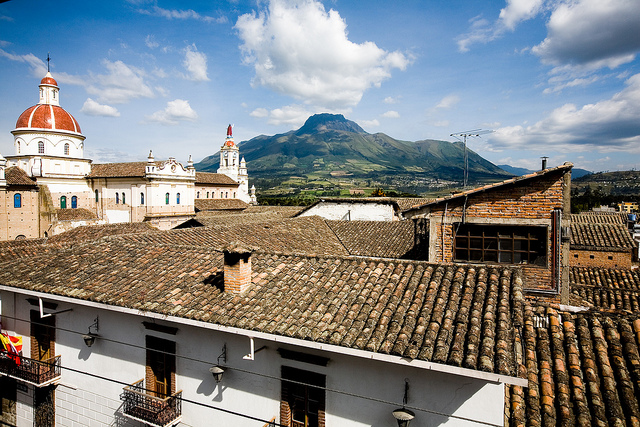
The cost of living is low in Ecuador, but especially so in smaller towns like Cotacachi. If you’re living on a budget or just looking to save money, this is a great place to do so.
Sunday is market day, when the villagers bring their wares to sell. Everything from fruits and vegetables to ground spices, woven baskets, and rope made of woven plastic shopping bags—recycling at its best. And then there are the roses…you pay $2 for one dozen, long-stemmed roses that are so fresh they last nearly three weeks.
On Saturdays head to Otavalo—to the largest open-air indigenous market in South America. If you’re a good negotiator, you can buy scarves, woolen socks, and hats for $2 each, or pretty wool and alpaca sweaters for $8 ($4 for kids’ sizes). The 30-minute bus ride from Cotacachi to Otavalo costs 35 cents; a taxi costs $5.
You can hire a maid to clean your condo for $10, and gardeners or landscapers charge around $4 per hour. Furnishing that same condo can be fun and inexpensive as well. There are master carpenters right in town that will build furniture to your specs for 50% to 75% of U.S. costs. Artistic paintings, colorful weavings, and wooden carvings are all easily found in the area and are priced at or below half of what you would pay back home.
Unless you must have imported food items or expensive cuts of meat you’ll save on your grocery bill here. Five dollars at the farmers’ market will get you an extra-large grocery bag filled to the brim with good healthy produce. Bananas, pineapples, mangos, avocados, tomatoes, leafy greens, and dozens of varieties of potatoes are just a few things you’ll find for sale. Whole chickens range from $5 to $8 depending on the size while fresh free-range eggs cost around $1.30 per dozen.
Many restaurants in town serve a menu del dia that consists of a beverage, soup, salad, main course, and dessert. How much? $2.50 each. It’s almost cheaper to eat out than to cook at home.
There are several good doctors in Cotacachi who typically charge $10 for an office visit. An eye exam costs $5 while a dental cleaning and exam will run around $20.
With the lack of severe temperature fluxes you’ll find that heating and air conditioning aren’t necessary, saving you plenty of money. Average electric costs for a household run between $15 and $20 per month. Monthly bills for water and propane gas usually come in at around $5 each. A package of cable TV, internet, and landline phone service can be had for around $100 per month.
Many folks live without a vehicle which eliminates fuel, maintenance, and insurance expenses. Bus fare usually averages around $1 per hour of travel time, and taxis are cheap too, charging $5 to nearby Otavalo (20 minute drive) and $12 to Ibarra (40 minute drive).
Depending upon the lifestyle you want a couple can easily live on $1,200 to $1,800 per month here. Of course frequent dining at high-end restaurants and traveling will require more income, but can still be done for far less than what it would cost in many other parts of the world. Don’t forget to factor in extra funds for trips back home, initial moving and visa costs, and for routine medical care.

Get Your Free Ecuador Report Here:
Learn more about Ecuador and other countries in our daily postcard e-letter. Simply enter your email address below and we'll send you a FREE REPORT - Ecuador: Live Well on Your Social Security.
This special guide covers real estate, retirement and more in Ecuador and is yours free when you sign up for our postcards below.
Is it Safe to Live in Cotacachi?
By Donna Stiteler
If you’re looking for a small town with lots to offer, Cotacachi is the place to be. Just ask any of the several hundred expats in town and they’ll tell you all about the great benefits of life in this little mountain village.
The first wave of expats ventured to Cotacachi in the early 2000s and got a boost a few years later when the popular television show House Hunters International featured one of the large adobe homes built during this era. These homes, costing around $150,000, started sprouting up in gated subdivisions within a short 10-minute taxi ride into town. Soon the migration of expats grew to around 700 and remains near that number to this day.
Cotacachi has a population of approximately 9,000 with 45 indigenous communities making up the surrounding countryside. The town is in a valley located between two volcanos—Imbabura and Cotacachi—so when you look out your window, you’ll be straddling two magnificent mountain views while enjoying spring-like weather year-round because of its proximity to the equator.
Unlike many other Ecuadorian expat locations, 50% of the population is indigenous. The indigenous people in Cotacachi are beyond nice, stopping to greet you in their local Quechua language. In fact, if you need directions, can’t find a specific item in town, or just have a general question about life here, simply ask any random person on the street. Chances are high that you’ll be greeted kindly, given detailed information, and told to have a great day.
There’s a quiet solitude people enjoy in this small town, but because it is a small expat community, the people here know each other and truly have each other’s backs. For those wanting social interaction, there are a plethora of cafes offering Starbucks-esque settings and quaint restaurants serving American favorites. There are lots of activities to choose from like volunteering, dancing to the live music of La Banda, playing cards, learning Spanish, or playing pickle ball. But expats here do not blend—our fair skin and height (the indigenous stand around five feet) can make us targets as we stand out.
John McNally has lived in Ecuador for nearly six years and has never felt unsafe, in danger, or threatened in anyway. “The few crimes here of which we are aware, are usually petty thefts of opportunity. Physical violence towards “gringos” is practically non-existent.”
He adds, “The local police are very cooperative and have actually set up special processes specifically to help “gringos” when the situation arises (translators, counselors to help us understand the law and how it is applied in specific instances, advice on home/personal security, etc.).”
Beverley Scherberger notes that Cotacachi is safe enough in town. However, she doesn’t suggest wandering around alone after dark especially on the outskirts of villages surrounding town after dark but instead to use taxis, which are plentiful and cost less than $3 to get anywhere in town.
“If people use their heads and are aware of their surroundings, don’t wear or carry obviously expensive jewelry, cameras, etc., keep their purses, wallets, or backpacks close, don’t carry large sums of money, and are aware of the people around them when going into or leaving the bank, they should be okay. I never, ever leave my backpack unattended and do not hang it on the back of my chair in a restaurant.”
Because Beverly lives alone in one of the large adobe homes just outside the city limits, she takes extra precautions. “I have heavy-duty bars on all doors and windows, have a hard-wired alarm system, and the doors are always locked, even when I’m at home.”
“I’ve lived here for nearly six years in my house. I’ve never been afraid living here alone, but I use my head when considering what I want to do and when I should do it.”

Jo Merriam agrees that one of the reasons she likes Cotacachi so much is because she feels so safe. “I walk home alone or with a girlfriend at night from concerts or other events, as does everyone else, and there’s nothing to worry about,” she says. “I’ve always lived in small towns, and Cotacachi is by far the safest place I’ve ever lived. There are no gangs here.”
The expats in Cotacachi know it’s important to be a part of their adopted culture and have created many social programs to give back to this humble community. I like to call it the Indigenous Mayberry. Cotacachi may be a step back in time, but I like its awkward naivety and overt friendliness, but to me, it’s a soft place to land for those who want to live quietly among the indigenous.

